No edit summary |
No edit summary |
||
| (11 intermediate revisions by the same user not shown) | |||
| Line 1: | Line 1: | ||
AMIBIOS is a personal computer BIOS developed by [[American Megatrends|AMI (American Megatrends)]] | AMIBIOS is a personal computer BIOS developed by [[American Megatrends|AMI (American Megatrends)]]. It was released in 1985 by Access Methods Inc. as one of the earliest fully and legally IBM PC-compatible BIOS for its clones. As the IBM PC's BIOS was copyrighted and early implementations based on its documentation suffered from legal trouble, companies like [[Phoenix Technologies|Phoenix]] and Access Methods reverse engineered their own solutions under a clean room design to avoid such trouble, with AMIBIOS being the latter's solution (shortly released after the former's [[PhoenixBIOS]]). It was then acquired by American Megatrends Inc. next year. | ||
While it is still used on some | While it is still used on some legacy computer systems (such as the ones based on [https://en.m.wikipedia.org/wiki/Vortex86 the Vortex86 SoC]), it was phased out on most consumer platforms in the early 2010s in favor of UEFI firmware such as [[AMI Aptio|Aptio]] (also by AMI), [[InsydeH2O|InsydeH2O,]] and [[Phoenix SecureCore]]. Although earlier instances of Aptio contained an embedded version of [[AMIBIOS 8]] as a component module for legacy boot (CSM). However, since CSM was discontinued by Intel in 2020, the module is no longer present.<ref>https://www.intel.com/content/www/us/en/content-details/630266/removal-of-legacy-boot-support-for-intel-platforms-technical-advisory.html | Note: Although this document was published in 2023, it clearly mentions legacy boot being discontinued in 2020.</ref> | ||
== | == Acquisition from Access Methods Inc. == | ||
''Main page: [[American Megatrends]]'' | ''Main page: [[American Megatrends]]'' | ||
Access Methods Inc. | Access Methods Inc., a joint venture by Subromanian Shankar and Pat Sarma, released the first version of AMIBIOS in 1985.<ref>https://twit.tv/shows/triangulation/episodes/226</ref> Due to legal issues, shortly after its release the owners found a new company with the funds raised by this joint venture. It was first called Quintessential Consultants Inc. (QCI), later renamed to American Megatrends Inc. (AMI) to keep the "AMIBIOS" acronym. The new company then acquired AMIBIOS from Access Methods next year.<ref>https://www.youtube.com/watch?v=5jYX3sL08Xs</ref> | ||
== List of known versions == | == List of known versions == | ||
All versions made before | All versions made before the [[AMI Plus BIOS]] were initially released by Access Methods and therefore in most cases had their copyright, although some of these versions later received revision updates under the American Megatrends ownership, therefore older versions could occasionally also be seen with newer copyright. | ||
Most instances (ROMs) of all versions from [[AMIBIOS 2.2x|AMIBIOS 2.x]] to [[AMIBIOS 6]] and also the [[AMIBIOS 07.00.10]] can be identified by the date shown in the identification string (which is often shown at the bottom of the POST screen), as these dates were fixed to the initial release date of the version. However, these dates were occasionally modified by [[wikipedia:Original_equipment_manufacturer|OEMs]] to reflect the ROM compile date instead, especially until [[AMI WinBIOS|AMI WinBIOS (AMIBIOS 4)]]'s release. On AMIBIOS 7 and 8, the date in the identification string indicates the ROM compile date instead and therefore cannot be used to determine the AMIBIOS version. | |||
'''Notice:''' | '''Notice:''' Due to lack of information and references, the names for all versions released before the AMI Hi-Flex BIOS are assumed based on little and unofficial information available. When more information is available, these will be corrected. | ||
{| class="wikitable" style="width:100;%" | {| class="wikitable" style="width:100;%" | ||
!Version name | !Version name | ||
!First release date | !First release date | ||
| Line 21: | Line 20: | ||
!Notes | !Notes | ||
|- | |- | ||
![[AMIBIOS 1.x]] | |||
!1985 | |||
!''Not available'' | |||
!The first version of AMIBIOS, currently no ROMs or pictures are available. | |||
|- | |- | ||
|[[AMIBIOS 2. | |[[AMIBIOS 2.x]] | ||
|1986 | |1986 | ||
|[[File:AMIBIOS_2.2x_POST.png|300px]] | |[[File:AMIBIOS_2.2x_POST.png|300px]] | ||
| | |The name is assumed based on information from the unofficial MR BIOS website<ref>https://mrbios.com/techsupport/award/postcodes.htm | "AMI BIOS 2.2x" section</ref> and therefore may not be correct. | ||
|- | |- | ||
|[[AMI Plus BIOS]] | |[[AMI Plus BIOS|AMI Plus BIOS(?)]] | ||
|1987 | |1987 | ||
|[[File:AMI_Plus_BIOS_POST.png|300px]] | |[[File:AMI_Plus_BIOS_POST.png|300px]] | ||
|Unofficially also called | |The name is assumed based on information from the unofficial MR BIOS website<ref>https://mrbios.com/techsupport/award/postcodes.htm | "AMI Plus BIOS" section</ref> and may not be correct. Unofficially also called the AMI Pre-Color BIOS due to its monochrome setup utility, which came out before [[AMI Hi-Flex BIOS|the AMI Hi-Flex BIOS]] with its colorful utility. | ||
|- | |- | ||
|[[AMI Hi-Flex BIOS]] | |[[AMI Hi-Flex BIOS]] | ||
|1990 | |November 1990 | ||
|[[File:AMI_Hi-Flex_BIOS_POST.png|300px]] | |[[File:AMI_Hi-Flex_BIOS_POST.png|300px]] | ||
|Not to be confused with the Hi-Flex Setup Utility on AMIBIOS 6 and | |Not to be confused with the Hi-Flex Setup Utility on [[AMIBIOS 6]] and [[AMIBIOS 07.00.10|07.00.10]], which was named after it. Unofficially also called AMI Color BIOS due to its colorful setup utility. Likely and internally also called AMIBIOS 3, although unconfirmed. | ||
|- | |- | ||
|[[AMI WinBIOS|AMI WinBIOS (AMIBIOS 4)]] | |[[AMI WinBIOS|AMI WinBIOS (AMIBIOS 4)]] | ||
|1993 | |December 1993 | ||
|[[File:WinBIOS_POST_screen.png|300px]] | |[[File:WinBIOS_POST_screen.png|300px]] | ||
|Often referred to as AMI WinBIOS, not to be confused with the WinBIOS Setup Utility on AMIBIOS | |Often referred to as the AMI WinBIOS, not to be confused with the WinBIOS Setup Utility on [[AMIBIOS 6]] (which was named after it). | ||
|- | |- | ||
|[[AMIBIOS 5]] | |[[AMIBIOS 5]] | ||
|1994 | |October 1994 | ||
|[[File:AMIBIOS 5 101094.png|300px]] | |[[File:AMIBIOS 5 101094.png|300px]] | ||
| | |Visually almost identical to the AMIBIOS 4, although contains new features and likely also initial bug fixes. | ||
|- | |- | ||
|[[AMIBIOS 6]] | |[[AMIBIOS 6]] | ||
|1995 | |July 1995 | ||
|[[File:AMIBIOS 6 POST screen.png|300px]] | |[[File:AMIBIOS 6 POST screen.png|300px]] | ||
| | |Also known as AMIBIOS 97 (1997), AMIBIOS 98 (1998) and AMIBIOS 99 (1999)<ref>https://web.archive.org/web/19970623225759/http://www.amibios.com/amibios.html</ref><ref>https://web.archive.org/web/19991012065711fw_/http://ami.com/amibios/bios.platforms.desktop.html</ref> | ||
|- | |- | ||
|[[ | |[[AMIBIOS 07.00.xx|AMIBIOS 7 (07.00.xx/07.00.00)]] | ||
|1999-2000 | |||
|1999 | |||
|[[File:AMIBIOS 07.00.xx POST.png|300px]] | |[[File:AMIBIOS 07.00.xx POST.png|300px]] | ||
|Not to be confused with AMIBIOS | |Commonly known as both AMIBIOS 07.00.xx and 07.00.00, officially called AMIBIOS V7.0<ref>https://web.archive.org/web/20000607010157fw_/http://www.ami.com/y2k_ami.html | "V.7.0" is listed as an AMIBIOS version, which must be 07.00.xx as 07.00.10 was not yet released at the time</ref>. Not to be confused with [[AMIBIOS 07.00.10]]. | ||
|- | |- | ||
|[[ | |[[AMIBIOS 07.00.10]] | ||
|April 2001 | |||
|2001 | |||
|[[File:AMIBIOS 07.00.10 POST.png|300px]] | |[[File:AMIBIOS 07.00.10 POST.png|300px]] | ||
| | |Despite the naming, this version is quite different from [[AMIBIOS 07.00.xx|AMIBIOS 7]]. It is functionally closer to [[AMIBIOS 6]] than it is to AMIBIOS 7. Therefore it is assumed to be an update to the AMIBIOS 6 codebase (possibly for meeting the [[wikipedia:PC_System_Design_Guide#PC_2001|PC 2001]] requirements) that was named 07.00.10 likely for marketing reasons only. | ||
|- | |- | ||
|[[AMIBIOS 8]] | |[[AMIBIOS 8]] | ||
|2001 | |October 2001 | ||
|[[File:AMIBIOS 8 POST screen (large logo).png|300px]] | |[[File:AMIBIOS 8 POST screen (large logo).png|300px]] | ||
|Last commercial version of AMIBIOS. May possibly be an update to AMIBIOS 7 for meeting the [[wikipedia:PC_System_Design_Guide#PC_2001|PC 2001]] requirements, although this is only a theory. | |||
|Last | |||
|- | |- | ||
|[[AMIBIOS 9]] | |[[AMIBIOS 9]] | ||
|''Unknown'' | |''Unknown'' | ||
|''Not available.'' | |''Not available.'' | ||
| | |Used in Microsoft Hyper-V. Assumed to be the name given to the BIOS emulation component for CSM/legacy mode in [[AMI Aptio]]. | ||
|} | |} | ||
== | == ROM identification string == | ||
The | The ROM identification string was first introduced with [[AMIBIOS 2.x]] and is often located at the bottom left of the POST screen. With this string, many useful details regarding the BIOS ROM can usually be gathered, such as the ROM size, chipset, motherboard manufacturer and sometimes even the AMIBIOS version. The string is formatted into sections with each containing different information regarding the ROM. The known codes for these sections are listed in [[Document:AMIBIOS string codes|the list of codes for BIOS strings]] (also available at the bottom of this page). The string format has been changed various times with some new releases of AMIBIOS. | ||
=== AMIBIOS 2. | === AMIBIOS 2.x === | ||
<code>MMMM-SSSSSS</code> | |||
* '''MMMM:''' Manufacturer/OEM identification code | |||
* '''SSSSSS:''' AMIBIOS version release date | |||
'''Example string''': 1406-061286 | '''Example string''': 1406-061286 | ||
This string is for | This string is for an AMIBIOS 2.x version released on June 12, 1986 ("061286") for Flying Triumph Co. Ltd. ("1406"). | ||
=== AMI Plus BIOS === | === AMI Plus BIOS === | ||
<code>DCCC-MMMM-SSSSSS-KK</code> | <code>DCCC-MMMM-SSSSSS-KK</code> | ||
''' | * '''D:''' CMOS setup type | ||
** '''Note:''' This section can also be two characters long for "DE" if the ROM contains both built-in diagnostics and an extended setup. | |||
* '''CCC:''' Chipset type | |||
* '''MMMM:''' Manufacturer/OEM identification code | |||
* '''SSSSSS:''' BIOS version release date | |||
* '''KK:''' Keyboard controller ID (with second character indicating the model). | |||
'''Example string''': D286-1277-043089-K0 | '''Example string''': D286-1277-043089-K0 | ||
This string is for | This string is for an AMI Plus BIOS version released on April 30, 1986 ("043089") with built-in diagnostics ("D") for a machine with a discrete logic chipset for [[wikipedia:Intel_80286|80286]] ("286") and a default/unknown keyboard controller (K"0") for Trangg Bow Co. ("1277"). | ||
=== AMI Hi-Flex BIOS and later versions === | |||
<code>CR-VVVV-00MMMM-FFFFFFFF-SSSSSS-DDDDDDDD-Project-Y2KC-K</code> | |||
* '''C:''' Processor architecture | |||
'''C:''' Processor architecture | * '''R:''' ROM size | ||
* '''MMMM:''' Manufacturer/OEM identification code | |||
* '''FFFFFFFF:''' BIOS feature identification | |||
** Usually "00101111" which is the default. | |||
* '''SSSSSS:''' BIOS compile date ([[AMIBIOS 07.00.xx|AMIBIOS 7]] and [[AMIBIOS 8|8]]) or the AMIBIOS version's initial release date (all other versions) | |||
** '''Note:''' Even on versions using the initial release date, this section was occasionally modified by the OEM to reflect the ROM release date instead. | |||
* '''DDDDDDDD:''' BIOS identifier (usually the chipset) | |||
* '''Project:''' internal BIOS project ID | |||
** Only used on later revisions of [[AMIBIOS 6]] and later versions. | |||
* '''Y2KC:''' unknown, most likely Year 2000 compatibility indicator | |||
** Only used on [[AMIBIOS 07.00.xx|AMIBIOS 7]] and [[AMIBIOS 8|8]]. | |||
* '''K:''' Keyboard controller ID | |||
** Not used on [[AMIBIOS 07.00.10]] and [[AMIBIOS 8|8]]. [[AMIBIOS 07.00.xx|AMIBIOS 7]] was the last version to show this section in the string. | |||
''' | '''Example string''': 61-0530-001169-00101111-071595-440BX/ZX-1AAET006-R | ||
This string is for a 05.30 version ("0530") 128 KB ("1")* size AMIBIOS 6 ROM ("071595", initial release date for AMIBIOS 6) for 686 architecture processors ("6") with Intel 440BX or ZX chipset ("440BX/ZX") and an AMIKEY '94 clone keyboard controller ("R") for project ID 1AAET006 of MSI ("1169"). | |||
<nowiki>*</nowiki>The BIOS ROM size is actually 256 KB in this specific case, the 128 KB size specified in the string is an error. This also means the string is not always fully accurate, although mostly is. | |||
=== List of known codes for | === List of known codes for sections of the ROM identification string === | ||
<div class="toccolours mw-collapsible mw-collapsed"> | <div class="toccolours mw-collapsible mw-collapsed"> | ||
Click "Expand" to view. | Click "Expand" to view. | ||
Latest revision as of 09:57, 4 August 2024
AMIBIOS is a personal computer BIOS developed by AMI (American Megatrends). It was released in 1985 by Access Methods Inc. as one of the earliest fully and legally IBM PC-compatible BIOS for its clones. As the IBM PC's BIOS was copyrighted and early implementations based on its documentation suffered from legal trouble, companies like Phoenix and Access Methods reverse engineered their own solutions under a clean room design to avoid such trouble, with AMIBIOS being the latter's solution (shortly released after the former's PhoenixBIOS). It was then acquired by American Megatrends Inc. next year.
While it is still used on some legacy computer systems (such as the ones based on the Vortex86 SoC), it was phased out on most consumer platforms in the early 2010s in favor of UEFI firmware such as Aptio (also by AMI), InsydeH2O, and Phoenix SecureCore. Although earlier instances of Aptio contained an embedded version of AMIBIOS 8 as a component module for legacy boot (CSM). However, since CSM was discontinued by Intel in 2020, the module is no longer present.[1]
Acquisition from Access Methods Inc.
Main page: American Megatrends
Access Methods Inc., a joint venture by Subromanian Shankar and Pat Sarma, released the first version of AMIBIOS in 1985.[2] Due to legal issues, shortly after its release the owners found a new company with the funds raised by this joint venture. It was first called Quintessential Consultants Inc. (QCI), later renamed to American Megatrends Inc. (AMI) to keep the "AMIBIOS" acronym. The new company then acquired AMIBIOS from Access Methods next year.[3]
List of known versions
All versions made before the AMI Plus BIOS were initially released by Access Methods and therefore in most cases had their copyright, although some of these versions later received revision updates under the American Megatrends ownership, therefore older versions could occasionally also be seen with newer copyright.
Most instances (ROMs) of all versions from AMIBIOS 2.x to AMIBIOS 6 and also the AMIBIOS 07.00.10 can be identified by the date shown in the identification string (which is often shown at the bottom of the POST screen), as these dates were fixed to the initial release date of the version. However, these dates were occasionally modified by OEMs to reflect the ROM compile date instead, especially until AMI WinBIOS (AMIBIOS 4)'s release. On AMIBIOS 7 and 8, the date in the identification string indicates the ROM compile date instead and therefore cannot be used to determine the AMIBIOS version.
Notice: Due to lack of information and references, the names for all versions released before the AMI Hi-Flex BIOS are assumed based on little and unofficial information available. When more information is available, these will be corrected.
| Version name | First release date | POST screen (if available) | Notes |
|---|---|---|---|
| AMIBIOS 1.x | 1985 | Not available | The first version of AMIBIOS, currently no ROMs or pictures are available. |
| AMIBIOS 2.x | 1986 | 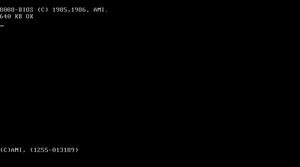
|
The name is assumed based on information from the unofficial MR BIOS website[4] and therefore may not be correct. |
| AMI Plus BIOS(?) | 1987 | 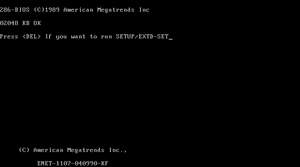
|
The name is assumed based on information from the unofficial MR BIOS website[5] and may not be correct. Unofficially also called the AMI Pre-Color BIOS due to its monochrome setup utility, which came out before the AMI Hi-Flex BIOS with its colorful utility. |
| AMI Hi-Flex BIOS | November 1990 | 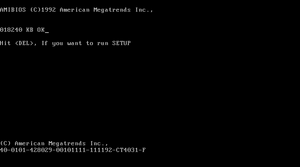
|
Not to be confused with the Hi-Flex Setup Utility on AMIBIOS 6 and 07.00.10, which was named after it. Unofficially also called AMI Color BIOS due to its colorful setup utility. Likely and internally also called AMIBIOS 3, although unconfirmed. |
| AMI WinBIOS (AMIBIOS 4) | December 1993 | 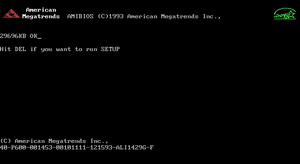
|
Often referred to as the AMI WinBIOS, not to be confused with the WinBIOS Setup Utility on AMIBIOS 6 (which was named after it). |
| AMIBIOS 5 | October 1994 | 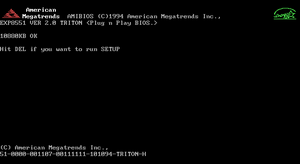
|
Visually almost identical to the AMIBIOS 4, although contains new features and likely also initial bug fixes. |
| AMIBIOS 6 | July 1995 | 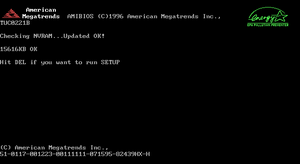
|
Also known as AMIBIOS 97 (1997), AMIBIOS 98 (1998) and AMIBIOS 99 (1999)[6][7] |
| AMIBIOS 7 (07.00.xx/07.00.00) | 1999-2000 | 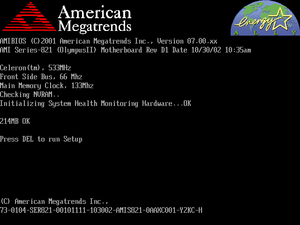
|
Commonly known as both AMIBIOS 07.00.xx and 07.00.00, officially called AMIBIOS V7.0[8]. Not to be confused with AMIBIOS 07.00.10. |
| AMIBIOS 07.00.10 | April 2001 | 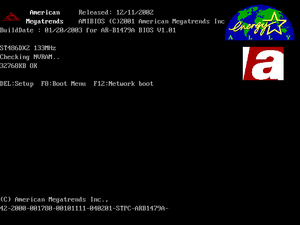
|
Despite the naming, this version is quite different from AMIBIOS 7. It is functionally closer to AMIBIOS 6 than it is to AMIBIOS 7. Therefore it is assumed to be an update to the AMIBIOS 6 codebase (possibly for meeting the PC 2001 requirements) that was named 07.00.10 likely for marketing reasons only. |
| AMIBIOS 8 | October 2001 | 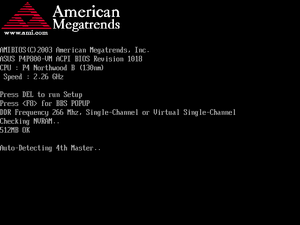
|
Last commercial version of AMIBIOS. May possibly be an update to AMIBIOS 7 for meeting the PC 2001 requirements, although this is only a theory. |
| AMIBIOS 9 | Unknown | Not available. | Used in Microsoft Hyper-V. Assumed to be the name given to the BIOS emulation component for CSM/legacy mode in AMI Aptio. |
ROM identification string
The ROM identification string was first introduced with AMIBIOS 2.x and is often located at the bottom left of the POST screen. With this string, many useful details regarding the BIOS ROM can usually be gathered, such as the ROM size, chipset, motherboard manufacturer and sometimes even the AMIBIOS version. The string is formatted into sections with each containing different information regarding the ROM. The known codes for these sections are listed in the list of codes for BIOS strings (also available at the bottom of this page). The string format has been changed various times with some new releases of AMIBIOS.
AMIBIOS 2.x
MMMM-SSSSSS
- MMMM: Manufacturer/OEM identification code
- SSSSSS: AMIBIOS version release date
Example string: 1406-061286
This string is for an AMIBIOS 2.x version released on June 12, 1986 ("061286") for Flying Triumph Co. Ltd. ("1406").
AMI Plus BIOS
DCCC-MMMM-SSSSSS-KK
- D: CMOS setup type
- Note: This section can also be two characters long for "DE" if the ROM contains both built-in diagnostics and an extended setup.
- CCC: Chipset type
- MMMM: Manufacturer/OEM identification code
- SSSSSS: BIOS version release date
- KK: Keyboard controller ID (with second character indicating the model).
Example string: D286-1277-043089-K0
This string is for an AMI Plus BIOS version released on April 30, 1986 ("043089") with built-in diagnostics ("D") for a machine with a discrete logic chipset for 80286 ("286") and a default/unknown keyboard controller (K"0") for Trangg Bow Co. ("1277").
AMI Hi-Flex BIOS and later versions
CR-VVVV-00MMMM-FFFFFFFF-SSSSSS-DDDDDDDD-Project-Y2KC-K
- C: Processor architecture
- R: ROM size
- MMMM: Manufacturer/OEM identification code
- FFFFFFFF: BIOS feature identification
- Usually "00101111" which is the default.
- SSSSSS: BIOS compile date (AMIBIOS 7 and 8) or the AMIBIOS version's initial release date (all other versions)
- Note: Even on versions using the initial release date, this section was occasionally modified by the OEM to reflect the ROM release date instead.
- DDDDDDDD: BIOS identifier (usually the chipset)
- Project: internal BIOS project ID
- Only used on later revisions of AMIBIOS 6 and later versions.
- Y2KC: unknown, most likely Year 2000 compatibility indicator
- K: Keyboard controller ID
- Not used on AMIBIOS 07.00.10 and 8. AMIBIOS 7 was the last version to show this section in the string.
Example string: 61-0530-001169-00101111-071595-440BX/ZX-1AAET006-R
This string is for a 05.30 version ("0530") 128 KB ("1")* size AMIBIOS 6 ROM ("071595", initial release date for AMIBIOS 6) for 686 architecture processors ("6") with Intel 440BX or ZX chipset ("440BX/ZX") and an AMIKEY '94 clone keyboard controller ("R") for project ID 1AAET006 of MSI ("1169").
*The BIOS ROM size is actually 256 KB in this specific case, the 128 KB size specified in the string is an error. This also means the string is not always fully accurate, although mostly is.
List of known codes for sections of the ROM identification string
Click "Expand" to view.
AMI Plus BIOS CMOS setup type codes: D CMOS Setup & Built-in Diagnostics E Extended CMOS Setup S Regular CMOS Setup DE Extended CMOS Setup & Built-in Diagnostics AMI Plus BIOS Chipset codes: C&T Chips & Technologies C&T 386 chipset NET Chips & Technologies NEAT chipset 286 VLSI or G2 286 chipset, or discrete 286 logic SUN SUNTAC chipset PAQ COMPAQ Portable or ZyMOS POACH chipset AMI AMI 386 motherboards G23 G23 chipset AMIBIOS ROM size codes 0 64KB 1 128KB/1MB/2MB 2 256KB 3 512KB 4 1MB 5 2MB 6 4MB 7 8MB 8 16MB 9 32MB AMIBIOS CPU architecture codes 2 286 3 386 4 486 5 586 6 686 AMIBIOS manufacturer codes: 0394 Sukjung 1101 Sunlogix Inc 1102 Soyo 1103 Tidalpower Technology Inc 1105 Autocomputer Co 1106 Dynasty Computer Inc 1107 Dataexpert 1108 Chaplet 1109 Fair Friend Ent. Co 1111 Paoku P&C Co 1112 Aquarius Systems Inc 1113 Micro Leader Enterprises 1114 Iwill 1115 Senor Science Co 1116 Chicony 1117 Atrend 1120 Unicorn 1121 FIC (FICA) 1122 Microstar (MSI) 1123 Magtron Technology Co 1124 Tekram 1126 Chuntex Elex 1128 Chaintech 1130 Pai Jung Electronic Ind 1131 ECS (Elitegroup) 1131 PC Chips (Hsin Tech) 1132 Dkine Enterprise Co 1133 Seritech 1135 Acer 1136 Sun's Electronics Co 1138 Win-Win Elecronic Co 1140 Angine Limited Taiwan Branch (H. K.) 1141 Nuseed Technology Inc 1142 Firich Enterprises Co 1143 Crete Systems Inc 1144 Vista Technology Co 1146 Taste Corporation 1147 Integrated Technology Express 1150 Achitec 1151 Accos Enterprise Co 1152 Top-Thunder Technology Co 1154 San Li 1156 Technica House 1158 Hi-Com Industrial Co 1159 Twinhead 1161 Monterey International Corp 1163 Softek Systems Co 1165 Mercury Computer Corporation 1168 RioWorks Solutions 1169 Microstar (MSI) 1169 NEC 1170 Taiwan Igel Co 1171 Shing Yunn Electronics Enterprise Corp 1172 Giantec 1175 Applied Component Technology Corp 1176 Sigma Computer Corp 1177 High Tech Computer Corp 1178 Clevo 1180 Padalin International Development Corp 1181 Leo Systems Inc 1182 Alpha-Top Corporation 1183 Mirle Automation Corporation 1184 Delta Electronics 1188 Quanta Computer 1190 Chips and Technologies 1192 ICP 1193 Ser Comm Corp 1195 Gns Technoloies Inc 1196 Universal Scientific Industrial 1197 Golden Way Electronic Corp 1199 Gigabyte 1201 New Tech 1203 Sunrex Technology Corp 1204 Bestekcomputer Co 1206 Olivetti 1209 Puretek Industrial Co 1210 Rise Computer 1211 DFI 1214 Rever Computer Inc 1218 ECS (Elitegroup) 1221 Darter 1222 Domex (DTC) 1223 Biostar 1225 Yunglin Technology Corp 1229 Dataworld International Corp 1234 Leadman Electronic Co 1235 Formosa Industrial Computing 1238 Win Tech Technology Co 1241 Mustek 1242 Amptek Technology Co 1244 Flytech Group International 1246 Cosmotech Computer Corp 1247 Abit 1248 Muse Technology Co 1251 Portwell Infotech 1252 Sono Computer 1256 Lucky Star 1258 Four Star Computer Co 1259 GVC 1260 Dt Research Inc 1262 Arima 1266 Modula Tech Co 1270 Portwell Inc 1271 Tidal Technolongies Inc 1272 Ultima Electronics Corp 1273 Ufo Computer Co 1274 Full Yes 1275 Jackson Dai Industrial Co 1276 Jetway 1277 Trangg Bow 1281 EFA 1283 Advance Creative Computer Corp 1284 Lung Hwa Electronics Co 1286 Askey 1291 TMC (Taiwan MyComp Corporation) 1292 Asus 1297 DD&TT Enterprise Inc 1299 Trigem 1301 Taken 1304 Dual Enterprises Corporation 1309 Protronic Enterprises Corp 1317 New Comm Technology Co 1318 Unitron 1323 Inventec 1343 Shuttle (Holco) 1346 Snobol Industrial Corp 1347 PC Chips (Hsin Tech) 1351 Singdak Electronic Co 1353 J-Bond 1354 Protech Systems 1355 Arrgo Systems Inc 1367 Coxswain Technology Co 1371 ADI 1373 Silicon Integrated Systems Corp 1379 WinTechnologies (Edom) 1391 Aten International Co 1392 Acc Taiwan Inc 1393 Plato Technology Co 1396 Tatung 1398 Spring Circle 1400 Key Win Electronics 1403 Uniwill 1404 Alptech Logic Products Inc 1421 Well Join Industry 1422 Labway Computer Co 1425 Lindata Corp 1437 PC Chips (Hsin Tech) 1440 Great Electronics Corporation 1450 Win Lan 1451 Ecel Systems Corp 1452 United Hitech Corporation 1453 Kaimei 1461 Hedonic Computer Co 1462 Arche Technologies Inc 1470 Free Tech 1470 Flexus Computer Technology 1472 Datacom Technology Co 1484 Mitac 1490 Great Tek Corp 1491 President Technology Inc 1493 Artdex Computer Corp 1494 Pro Team Computer Corp 1500 Netcon Co 1503 Up Right Tech Co 1514 Wuu Lin Electronics Co 1519 EPoX 1526 Eagle Computer Technology Co 1531 Force System Inc 1540 BCM 1546 Golden Horse Computer Co 1549 Ct Continental Corp 1564 Random Technology Inc 1576 Jetta 1585 Gleem Industries Co 1588 Boser 1593 Advantech 1594 Mitac 1608 CMC 1612 Datavan International 1617 Honotron Corporation 1618 Union Genius Computer Co 1621 New Paradise Enterprise Co 1622 R.P.T. Intergroups International 1628 Digital Equipment International 1630 Iston Computer Corp 1647 Lantic Inc 1652 Ase Technologise Inc 1655 Kingston Technology Inc 1656 Storage System Inc 1658 Macrotek 1666 Cast Technology Inc 1671 Cordial Far East Corp 1672 Lapro Corporation 1675 Advanced Scientific Corp 1685 High Ability Computer Co 1691 Gain Technology Co 1697 Olivetti 1700 Dsg Technology Inc 1707 Chaining Computer & Communiction Co 1708 E-San Electronic Co 1719 Taiwan Turbo Technology Co 1720 Fantas Technology Co 1723 Ntk Computer Inc 1737 Ay Ruey International Co 1739 Jetpro Infotech Co 1743 Mitac 1759 BEK-Tronic Technology 1762 Ansoon Technology Co 1770 AOpen 1771 Toyen Computer Co 1774 Acer Sertek Inc 1776 Joss Technology 1780 Acrosser 1783 Efar Microsystems, Inc Taiwan Bran 1788 Systex Corporation 1792 U-Board 1794 Cmt-Taiwan, Inc 1796 J&J Technology 1800 Syzygia Computer Corporation 1801 Palit Microsystems Inc 1806 Interplanetary Information Co 1807 Expert Electronic Corp 1810 Elechands International Co 1815 Powertech 1820 Ovis Enterprises Co 1823 Inlog Microsystem 1826 Tercomputer Technologies Corp 1827 Anpro Inc 1828 AXIOM 1840 New Union H.K. New Union H.K. 1845 Pc Direct Technology Co 1846 Garnet International Corp 1847 Brain Power Co 1850 Htr Asia Pacific Inc 1853 Veridata Electronics Inc 1856 Smart D&M Technology 1867 Lth Rong Electronic Enterprise Co 1868 Soyo 1879 Aeontech International Co 188 Quanta Computer 1881 Manufacturing Technology Resources 1888 Seal International Corp 1889 Rock Technology Lo 1906 Freedom Data Technology Co 1914 Aquarius Systems Inc 1917 Source Of Computer Co 1918 Lanner Electronics 1920 Ipex Itg International 1924 Join Incorporation 1926 Kou Sheng Computer Co 1927 Seahill Technology Co 1928 Nexcom International Co 1929 Cam Enterprise Inc 1931 Aaeon 1932 Kuei Hao Industrial Co 1933 Asmt Corp 1934 Silver Bally Inc 1935 Prodisti Co 1936 Codegen Technology Co 1937 Orientech Electronics Corp, 1938 Project Information Company, 1939 Arbor Technology Corp 1940 Suntop Computer Systems Corp 1941 Funtech Entertainment Corp 1942 Sunflower Systems Inc 1943 Needs System Development Co 1945 Norm Advanced Technology Corporation 1947 Ten Yun Co 1948 Beneon Co 1949 National Advantages Computer Inc 1950 Mits Technology Co, 1951 Macromate Corp 1953 Orlycon Enterprise Co 1954 Chung Yu Electronics Co 1955 Yamashita 1957 High Large Corporation. 1958 Young Micro Systems 1959 Fastfame Technology Co., Ltd. 1960 Acqutek Corporation 1961 Deson Trade Inc 1962 Astra Communication Corp 1963 Dimensions Electronics Co 1964 Micron Design Technology Limited 1965 Cantta Enterprises Co 1968 Khi Way Enterprise Co 1969 Gemlight 1970 Mat Technologies Limited Norm Advanced Technology Corp 1973 Fugutech 1974 Green Taiwan Computer Co 1975 Supertone Electronic Co 1977 AT&T Taiwan Telecommunications Co 1978 Winco 1980 Teryang Systems Co 1981 Nexcom International Co 1982 China Semiconductor Corporation 1985 Top Union Electronics Corp 1986 Dmp Electronics Co 1988 Concierge Co, Ctd. 1989 Atherton Technology Co 1990 Expen Tech 1994 Japan Cere'Bro Computers Inc 1996 Ikon Technologies Corporation 1998 Sono Computer 3642 AMI 4500 PcPartner 4668 AMI 4707 AMI 4724 AMI 5701 AMI 5706 AMI 5711 AMI 5721 AMI 5722 AMI 5727 AMI 6063 IBM 6064 AIR 6100 Unika 6105 Dolch computer systems 6132 Technology Power Enterprises 6154 Sprite Inc. 6156 Genoa 6247 TTC Computer Products Irving 6259 VEGA 6259 Young Micro 6285 Tyan 6326 Crystal 6328 Alaris 6333 Addtech 6362 Northgate Computer Systems Inc 6362 Seanix 6385 HP 6386 Pacific Information, Inc 6389 Supermicro 6395 Lion Computer 6423 APC 6666 CTL Corp 6730 AMI 6735 AMI 6745 AMI 6750 AMI 6759 AMI 6770 AMI 6774 AMI 6781 AMI 6782 AMI 7803 AMI 8003 QDI 8021 Acer 8028 Wellstar 8031 Zida 8036 DTK 8045 VTech 8045 PcPartner 8045 Aristo 8054 Pine Technology 8060 GB486 Computer systems 8200 Gateway 891E Veridata Electronics Inc 9999 Generic code AMIBIOS keyboard controller (KBC) codes: 0 Almost always means command A1 (return KBC revision) has not returned a byte 5 AMI Megakey KB-5 (1995) (Copyright string returned by command A0 is 1994), most often seen on NSC and SM(S)C Super I/O chips 7 Unknown AMI clone 8 AMI '8' 9 Everex AMI A V-Tech chipset on-chip AMI clone B AMI 'B' D AMI 'D' E AMI 'E', also seen on some ALi M1489 boards when the output of the Read Command Byte Command gets mixed up for A1 output F AMIKEY (original) or its clone H AMIKEY-2 or its clone, AMIKEY-2 is seen on ITE and Winbond Super I/O chips M MR (Microid Research) AMI clone from 1991 P AMI Megakey (1993) R AMI Megakey (1994) (Copyright string returned by command A0 is 1993) X Most likely AMIKEY-3 for the 388xx, seen on a NEC LaVie C laptop U SARC 6042, also seen on some ALi M1489 boards when the output of the Read Command Byte Command gets mixed up for A1 output Z TriGem AMI, two variants exist - normal (based on 'F') and green (based on some revision of Megakey)
- ↑ https://www.intel.com/content/www/us/en/content-details/630266/removal-of-legacy-boot-support-for-intel-platforms-technical-advisory.html | Note: Although this document was published in 2023, it clearly mentions legacy boot being discontinued in 2020.
- ↑ https://twit.tv/shows/triangulation/episodes/226
- ↑ https://www.youtube.com/watch?v=5jYX3sL08Xs
- ↑ https://mrbios.com/techsupport/award/postcodes.htm | "AMI BIOS 2.2x" section
- ↑ https://mrbios.com/techsupport/award/postcodes.htm | "AMI Plus BIOS" section
- ↑ https://web.archive.org/web/19970623225759/http://www.amibios.com/amibios.html
- ↑ https://web.archive.org/web/19991012065711fw_/http://ami.com/amibios/bios.platforms.desktop.html
- ↑ https://web.archive.org/web/20000607010157fw_/http://www.ami.com/y2k_ami.html | "V.7.0" is listed as an AMIBIOS version, which must be 07.00.xx as 07.00.10 was not yet released at the time